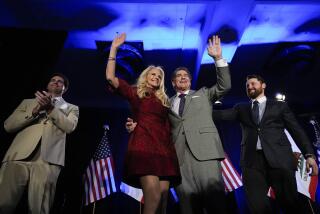State Senate Clears Way for March Primary
SACRAMENTO — In a move designed to give California more clout in the choosing of presidential candidates, the state Senate voted Thursday to advance the 1996 presidential primary election from June to March.
The Assembly already has approved a similar measure and is expected give easy approval to Senate amendments. The legislation then would advance to Gov. Pete Wilson, whose aides said Thursday he is likely to sign it.
The 27-7 vote by the Senate reverses years of inertia on an issue that has placed the state with the largest bloc of convention delegates at the tail end of the presidential primaries, when Republican and Democratic candidates usually have their party’s nominations wrapped up. As a result, California votes have rarely mattered in the selection of presidential candidates.
“This bill will again make California a major player in the presidential sweepstakes,” said Sen. Art Torres (D-Los Angeles).
The early primary not only would reshape presidential politics in California but could dramatically alter national nomination politics, dominated for nearly two decades by the small states of Iowa and New Hampshire. For one thing, other states might respond to the earlier California contest by moving up their primaries, telescoping the entire selection period.
California also is a notoriously expensive political market and experts have speculated that it could make it more difficult for less well-known and underfunded candidates to face an early test here.
The current bill would establish the 1996 primary for March 26 as a one-time-only experiment, not a permanent change. Future legislatures could make it a fixture if they regard the results as a success.
The bill would move the primary for all Congressional, state legislative and some local races to March. The general election runoff in November would remain unchanged, which would mean an extended general election campaign.
Reaction from partisans outside the Legislature was favorable.
“It’s about time that California is able to wield its muscle,” observed Bob Mulholland, political director of the California Democratic Party.
John Peschong, communications director for the state GOP, said most Republican leaders believe the move would increase the state’s political clout.
Proposals for moving California’s presidential primary have risen and fallen for more than a decade, typically foundering in obscure political currents before election years.
California Republicans tended to be more supportive of the early primary after it became apparent that Wilson could be a future presidential contender.
Mulholland said he thought a trial run in 1996 would be particularly helpful to Democrats because it could help President Clinton wrap up the party nomination early, in the event he seeks a second term and is challenged by any other Democrats.
Republicans might have a bitter, costly shootout in California as a host of candidates seek the GOP nomination, he said. In California, the GOP primary is winner-take-all, whereas the Democrats divide their delegates proportionately.
In truth, it is impossible to predict just what will happen. In recent years, Southern states banded together to create the Super Tuesday primary following Iowa and New Hampshire, seeking to stack the nomination process in favor of a moderate Democrat more acceptable to the South.
But the Super Tuesday concept did not work as intended. The conservative vote often was split among a variety of contenders while Jesse Jackson won the bulk of the black vote and swept many Southern primaries. A number of the Southern states have moved their primaries back to their traditional dates.
A number of state lawmakers and leaders of both state parties long have complained about presidential candidates coming into the state to raise campaign funds that are then spent on races in early primary states.
“Why should Iowa, New Hampshire and the Southern states pick our (presidential) nominees while Californians pay the campaign costs?” Torres said Thursday. He noted that by the time Californians vote, more than 85% of the convention delegates have been chosen elsewhere.
California last played a key role in the Republican presidential 1964 primary when Barry Goldwater opposed Nelson Rockefeller. On the Democratic side, the state last was pivotal in the 1972 contest between George McGovern and Hubert H. Humphrey.
Favorable action Thursday by the state Senate, historically the stumbling block for early primary bills, caps a dogged 14-year campaign by Assemblyman Jim Costa (D-Hanford) to make California a major player in the primaries.
The previous early primary legislation, although usually winning approval in the Assembly, often fell victim to political self-interest in the Senate. Members of both parties, among other reasons, complained privately that it could cut into their own fund-raising efforts.
Democratic backers of the Costa bill said they agreed to the one-year-only feature as a compromise to help win the support of Wilson and Assembly Republicans who were unsure what changes might result from the shift.
Spirited debate had marked previous Senate attempts to enact early primary bills, but discussion of the issue Thursday was desultory.
Ingram reported from Sacramento; Stall was in Los Angeles.
More to Read
Get the L.A. Times Politics newsletter
Deeply reported insights into legislation, politics and policy from Sacramento, Washington and beyond. In your inbox three times per week.
You may occasionally receive promotional content from the Los Angeles Times.










